| Joss paper | |||||||||||
|---|---|---|---|---|---|---|---|---|---|---|---|
 Traditional joss paper (金紙) sold in stacks at a store Traditional joss paper (金紙) sold in stacks at a store | |||||||||||
| Chinese name | |||||||||||
| Traditional Chinese | 金紙 | ||||||||||
| Simplified Chinese | 金纸 | ||||||||||
| Literal meaning | gold paper | ||||||||||
| |||||||||||
| Alternative Chinese name | |||||||||||
| Traditional Chinese | 陰司紙 | ||||||||||
| Simplified Chinese | 阴司纸 | ||||||||||
| Literal meaning | netherworld paper | ||||||||||
| |||||||||||
| Second alternative Chinese name | |||||||||||
| Traditional Chinese | 紙錢 | ||||||||||
| Simplified Chinese | 纸钱 | ||||||||||
| Literal meaning | paper money | ||||||||||
| |||||||||||
| Third alternative Chinese name | |||||||||||
| Traditional Chinese | 冥幣 | ||||||||||
| Simplified Chinese | 冥币 | ||||||||||
| Literal meaning | shade/dark money | ||||||||||
| |||||||||||
| Vietnamese name | |||||||||||
| Vietnamese alphabet | tiền vàng mã tiền âm phủ đồ mã | ||||||||||
| Hán-Nôm | 錢鐄𦄀 錢陰府 圖𦄀 | ||||||||||
Joss paper, also known as incense papers, are papercrafts or sheets of paper made into burnt offerings common in Chinese ancestral worship (such as the veneration of the deceased family members and relatives on holidays and special occasions). Worship of deities in Chinese folk religion also uses a similar type of joss paper. Joss paper, as well as other papier-mâché items, are also burned or buried in various Asian funerals, "to ensure that the spirit of the deceased has sufficient means in the afterlife". In Taiwan alone, the annual revenue that temples received from burning joss paper was US$400 million (NT$13 billion) as of 2014.
Use
| This section includes a list of general references, but it lacks sufficient corresponding inline citations. Please help to improve this section by introducing more precise citations. (March 2013) (Learn how and when to remove this message) |
Spirit money is most often used for venerating those departed but has also been known to be used for other purposes such as a gift from a groom's family to the bride's ancestors. Spirit money has been said to have been given for the purpose of enabling their deceased family members to have all they will need or want in the afterlife. It has also been noted that these offerings have been given as a bribe to Yanluo Wang to hold their ancestors for a shorter period of time.
Venerating the ancestors is based on the belief that the spirits of the dead continue to dwell in the natural world and have the power to influence the fortune and fate of the living. The goal of ancestor worship is to ensure the ancestor's continued well-being and positive disposition towards the living and sometimes to ask for special favours or assistance. Rituals of ancestor worship most commonly consist of offerings to the deceased to provide for their welfare in the afterlife which is envisioned to be similar to the earthly life. The burning of spirit money enables the ancestor to purchase luxuries and necessities needed for a comfortable afterlife.
-
Woman burning joss papers in front of her house in Hanoi after offering food to her ancestors
-
 Joss paper of the silver variety being folded for burning
Joss paper of the silver variety being folded for burning
-
 Joss paper folded and ready to be burned as an offering
Joss paper folded and ready to be burned as an offering
Many temples have large furnaces outside the main gate to burn joss paper. Folding the paper is an essential part of the burning ceremony as it distinguishes joss paper from actual money; and, it provides good luck for those who fold it. Burning actual money would be untenable for most people, and is also considered unlucky in Asian cultures. The Joss paper may be folded into specific shapes which are meant to bring on good luck and people tend to burn lavish amounts to ensure that the offering is well received.
People burn joss paper during many occasions, e.g., Lunar New Year, Ghost Festival, Mid-Autumn Festival, Dongzhi (Winter solstice), Qingming Festival, Chongyang Festival, Dragon Boat Festival, etc.
Every fifteen days business owners in Taiwan burn spirit money in red braziers and set out offering tables on the sidewalk for both gods and ghosts. This coincides with an ancient calendar system divided into twenty-four fifteen-day periods.
A simplified modern Chinese offering is made by drawing a circle with chalk on the sidewalk or the pavement between residential buildings and burning the paper offering within the circle. This is quite common in all Chinese cities and villages today.
Due to environmental concerns, some contemporary Joss paper burners are now fitted with a special cover which eliminates the spread of burning ashes. The cover allows enough oxygen in to ensure that all of the offering are completely burned.
Spirit money is most commonly burned, but may also be offered by being held into the wind or placed into the deceased's coffin at funeral ceremonies.
Depending on the type and status of the deity being worshiped, paper with metal foil or with ink seals of various sizes may be burned. Different regions of the world have different preferences for the type of Joss paper that is used. For instance, Hell Bank Notes are commonly found in regions where Cantonese populations dominate but are rarely seen or used in places such as Taiwan or Macau, which use "gold paper". The Joss paper is folded in half, or bought pre-folded into the shape of gold ingots before being burned in an earthenware pot or a specially built chimney. Joss paper burning is usually the last performed act in Chinese deity or ancestor worship ceremonies. The papers may also be folded and stacked into elaborate pagodas or lotuses.
In Taoist rituals, the practice of offering joss paper to deities or ancestors is an essential part of the worship. Some Chinese Buddhist temples, such as Singapore Buddhist Lodge in Singapore and all Fo Guang Shan affiliated temples in Taiwan have discouraged offering of joss papers during ancestral worship in their ancestral tablet hall out of concern for the environmental pollution.
Western countries
Shops selling joss paper goods have been established in Western countries – such as the USA or the United Kingdom – by Chinese immigrants. For example, Mulberry Street in New York, also known as Chinatown, has papier-mâché retailers which are similar to those in Hong Kong. They serve the Chinese who are living there, in order to celebrate Chinese festivals.
Health impact
Further information: Particulates § Health effectsMetal contents analysis of ash samples shows that joss paper burning emits a lot of toxic components causing health risks. There is a significant amount of heavy metals in the dust fume and bottom ash, e.g., aluminium, iron, manganese, copper, lead, zinc and cadmium. Another study found that burning gold and silver joss papers during festivals may contribute to Parkinson's disease among the elderly and slow child development.
Types
Traditional
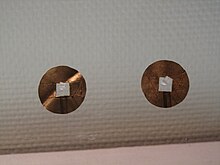
Joss paper is traditionally made from coarse bamboo paper, which feels handmade with many variances and imperfections, although rice paper is also commonly used. Traditional joss is cut into individual squares or rectangles. Depending on the region, Joss paper may be decorated with seals, stamps, pieces of contrasting paper, engraved designs or other motifs.
Different types of spirit money are given to distinct categories of spirits. The three main types of spirit money are cash (also known as copper), silver and gold. Cash monies are given to newly deceased spirits and spirits of the unknown. Golden Joss papers (jin) are mostly offered to the Deities such as the Jade Emperor. Silver Joss paper (yin) is given to ancestral spirits as well as other spirits. These distinctions between the three categories of spirit money must be followed precisely to avoid confusing or insulting the spirits.
-
 Dabai Shoujin (大百壽金, lit. "longevity gold"): large paper squares with a golden metallic rectangle imprinted with Fu, Lu & Shou (Three Stars), can be offered to heavenly Deities.
Dabai Shoujin (大百壽金, lit. "longevity gold"): large paper squares with a golden metallic rectangle imprinted with Fu, Lu & Shou (Three Stars), can be offered to heavenly Deities.
-
 Yijin (刈金, lit. "cut gold"): large paper squares with a golden metallic rectangle, can be offered to any level of Deities.
Yijin (刈金, lit. "cut gold"): large paper squares with a golden metallic rectangle, can be offered to any level of Deities.
-
 Jiujin (九金, lit. "nine gold"): large paper squares with a golden metallic rectangle and printed with angled shapes and characters, popular in Southern Taiwan, used to be offered to Deities's spiritual soldiers, more common offer in ancestral worship and earth guardians nowadays.
Jiujin (九金, lit. "nine gold"): large paper squares with a golden metallic rectangle and printed with angled shapes and characters, popular in Southern Taiwan, used to be offered to Deities's spiritual soldiers, more common offer in ancestral worship and earth guardians nowadays.
-
 Xiaoyin (小銀, lit. "lesser silver"): small paper squares with a silver metallic rectangle, burned for close relatives, ancestors and spirits.
Xiaoyin (小銀, lit. "lesser silver"): small paper squares with a silver metallic rectangle, burned for close relatives, ancestors and spirits.
-
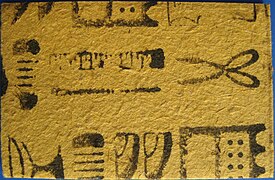 Jingyi (經衣, lit. "threads and clothes"): A type of joss paper with images of items needed by the dead as "daily necessity", such as clothes, shoes, cups, and scissors, printed on the surface.
Jingyi (經衣, lit. "threads and clothes"): A type of joss paper with images of items needed by the dead as "daily necessity", such as clothes, shoes, cups, and scissors, printed on the surface.
Contemporary
| This section possibly contains original research. Please improve it by verifying the claims made and adding inline citations. Statements consisting only of original research should be removed. (February 2022) (Learn how and when to remove this message) |
More contemporary or westernized varieties of Joss paper include paper currency, credit cards, cheques, as well as papier-mâché clothes, houses, cars, toiletries, electronics and servants (together known as Zhizha in Mandarin zhǐzhā zh:紙紮). The designs on paper items vary from the very simple to very elaborate (with custom artwork and names).
In 2006, in response to the burning of "messy sacrificial items", such as paper cars, houses, and pills, Dou Yupei, the PRC deputy minister for civil affairs, announced that the ministry intended to ban at least the more extreme forms of joss paper.
-
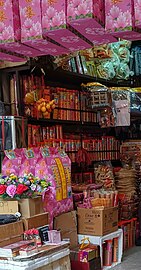 A shop selling joss paper goods in Hong Kong 1
A shop selling joss paper goods in Hong Kong 1
-
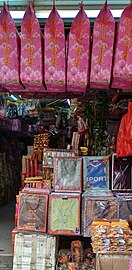 A shop selling joss paper goods in Hong Kong 2
A shop selling joss paper goods in Hong Kong 2
-
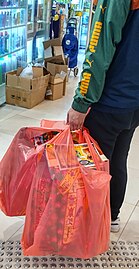 A man carrying bags of joss paper goods
A man carrying bags of joss paper goods
-
 A modern type of joss paper in the folded form and colour of gold bars
A modern type of joss paper in the folded form and colour of gold bars
-
Joss paper goods on sale in Hong Kong
-
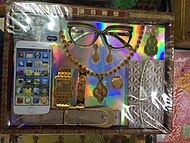 A set of papier-mâché offerings with iPhone and accessories for a female deceased
A set of papier-mâché offerings with iPhone and accessories for a female deceased
"Hell Bank Notes"
Main article: Hell moneyMuch like the traditional gold and silver paper, Hell Bank Notes are a modernized version of joss paper and serve as the official currency for the afterlife. Living relatives offer them to dead ancestors by burning (or placing them in coffins in the case of funerals) the bank notes as a bribe to Yanluo for a shorter stay or to escape punishment, or for the ancestors themselves to use in spending on lavish items in the afterlife.
The word "hell" may have been derived from:
- The preaching of Christian missionaries, who told the Chinese that non-Christians and their ancestors would go to hell when they died as non-believer. Purgatory as taught by certain Christian denomininations is a parallel.
- A translation of the word "hell" that matches the pre-existing Chinese concept of "underworld realm", which in Taoist cosmology had been considered one of the destinations on the journey of rebirth of every soul of the dead regardless of his or her virtue during life.
Hell Bank Notes are also known for their enormous denominations ranging from ten thousand to five million. The bills almost always are in the form of dollars or yuan, and usually feature an image of either the Jade Emperor or Yanluo Wang on the front and the "headquarters" of the Hell Bank on the back. Another common feature is the signatures of both the Yanluo Wang and the Judges of Underworld, both of whom apparently also serve as the Hell bank's governor and deputy governor (as featured on the back). Yet another feature is a Hell Bank Note being a replica of a United States one-hundred-dollar bill, with a disclaimer noting the bill is counterfeit.
Regulation
| This section needs expansion. You can help by adding to it. (April 2024) |
Certain provinces in China have banned the burning of joss paper out of concern for the air pollution it causes.
See also
Health
Others
References
- Everington, Keoni (8 November 2016). "Monks gone wild: Fast and furious nuns, monks peering at porn". Taiwan News. Retrieved 17 November 2016.
- "2023地基主怎麼拜?祭拜方位、準備供品、最佳時間一次看,命理師加碼「開運小祕訣」-風傳媒". Storm.mg (in Traditional Chinese). 23 October 2023. Retrieved 25 December 2023.
- 黃, 偉江. "清明紙紮品熱賣 (Papier-mâché products become hot items in Ching Ming Festival)". Sing Tao Daily. Sing Tao Ltd.
- Giang, Lam Van; Thanh, Tran; Hien, Truong Thanh; Tan, Lam Van; Thi Bich Phuong, Tran; Huu Loc, Ho (2021). "Heavy metals emissions from joss paper burning rituals and the air quality around a specific incinerator". Materials Today: Proceedings. 38: 2751–2757. doi:10.1016/j.matpr.2020.08.686. S2CID 226353498.
- Khezri, B.; Chan, Y. Y.; Tiong, L. Y. D.; Webster, R. D. (2015). "Annual air pollution caused by the Hungry Ghost Festival". Environmental Science: Processes & Impacts. 17 (9): 1578–1586. doi:10.1039/C5EM00312A. hdl:10356/82684. PMID 26220212.
- Doctors warn on toxic incense, joss papers
- Vellingiri B, Suriyanarayanan A, Selvaraj P, Abraham KS, Pasha MY, Winster H, Gopalakrishnan AV, G S, Reddy JK, Ayyadurai N, Kumar N, Giridharan B, P S, Rao KR, Nachimuthu SK, Narayanasamy A, Mahalaxmi I, Venkatesan D (August 2022). "Role of heavy metals (copper (Cu), arsenic (As), cadmium (Cd), iron (Fe) and lithium (Li)) induced neurotoxicity". Chemosphere (review). 301: 134625. Bibcode:2022Chmsp.30134625V. doi:10.1016/j.chemosphere.2022.134625. PMID 35439490.
- "拜 神 教 室". Archived from the original on 26 November 2022. Retrieved 5 April 2010.
- "簡介:冥鏹及衣紙". Archived from the original on 8 December 2012. Retrieved 5 April 2010.
- 衣紙2 Archived 2012-03-13 at the Wayback Machine
- "拜神用的金銀元寶衣紙及其他的排列次序". Archived from the original on 11 July 2011. Retrieved 5 April 2010.
- "For the (dead) Chinese man who has everything: cars and Viagra". The Telegraph. 22 March 2007. Retrieved 3 April 2024.
- Jie, Yan (16 March 2017). "To Improve Air Quality, Harbin Bans Burning Ghost Money". Sixth Tone. Retrieved 23 September 2023.
- Adler, J. (2002). Chinese Religious Traditions. London: Laurence King Publishing, Ltd.
- Asian Joss Paper: Rubber Trouble. Retrieved October 23, 2008 from http://rubbertrouble.com/joss.php Archived 2013-06-27 at the Wayback Machine
- Burning of Joss Paper. Retrieved October 23, 2008 from https://web.archive.org/web/20070713050534/http://app.nea.gov.sg/cms/htdocs/article.asp?pid=720
- Feuchtwang, S. (2001). Popular Religion in China. Surrey: Curzon Press.
- Gates, H. (1987, July). Money for the Gods. Modern China, 13(3), 259–277. Retrieved from JSTOR database.
- Hell bank notes - Library - Collection - Studio - Collectors Software. Retrieved October 23, 2008 from Archived 15 March 2023 at the Wayback Machine
- Joss Paper. Retrieved October 24, 2008
- Seaman, G. (1982 Fall). Spirit Money: An Interpretation. Journal of Chinese Religions.
- Thompson, L. (1989). Chinese Religion. Belmont, California: Wadsworth Publishing Company.
Further reading
- A systematic literature review on the association between exposures to toxic elements and an autism spectrum disorder
- Estimation of cancer risk due to exposure to lead contamination in Joss paper
- Burning Incense for Worshipping in the Public Area of Public Housing Estates (2003)
- Effects on cement after partial replacement with burned joss paper ash
- Housing dimensions - HK (2011)
- Special Arrangement for Joss Paper Burners in Tsang Tsui Columbarium around the Chung Yeung Festival 2022
- Burning Paper Money To Honor Ancestors And Break Generational Curses
Regulation / advice from governments
- Compliance Assistance, Joss Paper and Paper Artifacts Burning
- Guidelines on Air Pollution Control for Joss Paper Burning at Chinese Temples, Crematoria and Similar Places
- Guidelines on Air Pollution Control for Paper Artifacts Burning at Funeral Parlours and Other Places of Worship
- “Rest in Breeze” 2016
- Upstairs Taoist shrine in Hung Hom convicted for smoke emission
- Changing Times for Joss Paper and Incense
- Joss burner cover, Singapore (2001)
- Image of joss paper burning container
- Image of joss paper burner
- The EPA encourages temples to reduce incense-burning
Different places
- Vietnamese lose burning desire to please the deceased with joss paper
- Parinda Sakdanaraseth The Future of Ritual, Joss paper culture in Thailand
- 13 per cent drop in number of complaints over joss paper burning during Hungry Ghost month (Singapore)
- China's Wuhan marks sombre Tomb Sweeping festival amid coronavirus
- Can Taiwan's burning boats end the pandemic?
- Modern paper offerings are breaking traditional stereotypes (Hong Kong)
External links
- Spread of burning ashes of joss paper after worship, temple Goddess of Mercy, Penang Island.
| Chinese exonumia | ||
|---|---|---|
| Alternative currencies | 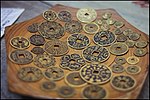 | |
| Numismatic charms and amulets | ||
| Stimulus packages | ||
| Others | ||
| ||
| Chinese paper money | ||||||||||||
|---|---|---|---|---|---|---|---|---|---|---|---|---|
| Imperial China |
|  | ||||||||||
| Privately produced | ||||||||||||
| Renminbi series | ||||||||||||
| New Taiwan dollar | ||||||||||||
| Hong Kong dollar | ||||||||||||
| Exonumia |
| |||||||||||
| See also: List of Chinese inventions | ||||||||||||
| Religious Confucianism | |
|---|---|
| Rituals | |
| Concepts | |
| Organizations | |
| People | |
| Buildings | |
| Objects | |
| Books | |
| Deities | |
| Tutelary deities | |